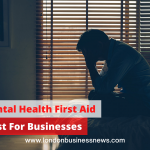Getting a mental health first aid certification gives your business and workforce more than a rudimentary understanding of the signs and symptoms of someone struggling with their mental health.
It’ll also give you as the manager or business owner the tools to identify when one of your colleagues is struggling and how to intervene to set them on a path towards full recuperation.
Mental health in the workplace is still somewhat of a taboo subject in the UK, making it imperative for organisations to generate awareness and acceptance of mental health issues while offering adequate support.
Creating a company culture where staff has opportunities to vent about their problems or concerns in the right places/with the right people will help create a healthier, happier, and more productive workforce.
Mental Health Problems are prevalent in UK Workplaces
 The vast majority of organisations are still unaware of the scale of the mental health problem in the UK; it’s bordering on a crisis.
The vast majority of organisations are still unaware of the scale of the mental health problem in the UK; it’s bordering on a crisis.
A staggering 41% of workers have experienced mental health issues either caused or exacerbated by work according to a Business in the Community and Bupa study in 2020. This shows that UK workplaces need to act.
If workplaces shoulder a proportion of this blame, why shouldn’t they do something about it? Mental health first aid training gives a workforce the ability to police their own mental health better.
While it doesn’t suggest that your business takes care of those suffering into their own hands, it does give organisations the ability to spot the tell-tale signs of someone struggling. From there, you and your team will have the training to broach the topic with care and sensitivity and put them in touch with someone who can professionally oversee their care.
Mental Health Problems caused by Work Pressure
 The above-mentioned study evidenced that 51% of mental health symptoms at work accumulate because of pressure. Often employees buckle under the pressure of their workload and are afraid to report this because of the fear of demotion or even dismissal. Companies apply pressure to their staff in several ways – from unrealistic workloads to the constant threat of demotion or promotion.
The above-mentioned study evidenced that 51% of mental health symptoms at work accumulate because of pressure. Often employees buckle under the pressure of their workload and are afraid to report this because of the fear of demotion or even dismissal. Companies apply pressure to their staff in several ways – from unrealistic workloads to the constant threat of demotion or promotion.
Identifying unhealthy sources of pressure and working alongside your staff to eradicate the burdensome impact will go a long way to creating a healthier workforce.
Mental Health is still a taboo subject
 Mental health has become much more widely discussed in the media in the last few years. That’s partly due to the influence of determining mental health charities and the crises that people in the public eye have gone through.
Mental health has become much more widely discussed in the media in the last few years. That’s partly due to the influence of determining mental health charities and the crises that people in the public eye have gone through.
But, in workplaces, mental health can still be a taboo subject. It’s understandable that employees are reluctant to discuss their issues – especially when they can be afraid of how that might prejudice their superiors’ impression of them.
Employers have a duty to change organisational attitudes towards mental health. Instituting companywide mental health first aid training will promote awareness of mental health in the workplace.
When it’s an ingrained, normal part of staff onboarding, it’ll no longer be something that is swept under the rug. When all your staff members are conversant in the vocabulary of mental health, it’ll be far easier for them to broach the topic; to speak to their manager or confide in their colleagues, who ideally should be a mental health first aider for the most effective handling.
Mental Health First Aid is a vital skill for all Employees & Managers
 Mental health first aid is a vital skill for all employers and their staff because if everyone is more educated about signs and symptoms of mental health issues such as anxiety, depression, psychosis, and self-harm, as well as how to signpost if someone expresses suicidal thoughts, help can be provided faster.
Mental health first aid is a vital skill for all employers and their staff because if everyone is more educated about signs and symptoms of mental health issues such as anxiety, depression, psychosis, and self-harm, as well as how to signpost if someone expresses suicidal thoughts, help can be provided faster.
No business can just rely on its HR department to take care of the issue because it affects everyone in the organisation, not just those who are visibly struggling.
Instead, you need to be proactive about mental health. Promoting awareness among employees will help create better policies and practices and the mental health first aiders can support the improvement of such policies.
The more we talk about mental health, the easier it becomes for us as individuals and organisations alike to tackle the problem. Because at the end of the day mental health problems affect our personal and professional lives hence being trained in how to handle such issues serves more as a life skill rather than just a work skill.
How Employers can improve Mental Health in the Workplace
 In order to create a healthier and more productive workforce, employers need to focus on the wellbeing of their staff as well as of their own. There are many ways that organisations can improve mental health within their company:
In order to create a healthier and more productive workforce, employers need to focus on the wellbeing of their staff as well as of their own. There are many ways that organisations can improve mental health within their company:
-Creating awareness of mental illness in the workplace
-Adequately measuring workloads so there’s less pressure for employees
-Encouraging work from home options when they are available
-Removing the stigma around people who have been diagnosed with depression or anxiety by making it clear that these diagnoses do not preclude them from working efficiently among other workers.
The idea behind this is to make sure your company fosters an environment where everyone feels comfortable discussing their problems at work – whether that be just one person struggling or 40% of your workforce being affected.
By providing the tools that mental health first aid training offers, you’re taking a small step towards creating an organisation where people can thrive, and their wellbeing is prioritised.
In Summary
The most important takeaway is that mental health in the workplace needs to be more accepted and talked about. Mental Health First Aid training for your workforce goes a long way towards changing organisational attitudes for more tolerance and understanding but also gives your team the tools they need to identify when someone might be struggling with their mental health so they can help them get back on track.
Author Profile

- Founder of Greatmindsatwork.com
- Al Chester is the founder of Great Minds At Work, a leading mental health first aid training company dedicated to supporting corporate and individuals through the promotion of mentally healthy workplaces.





